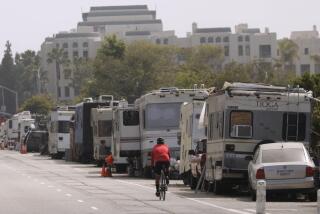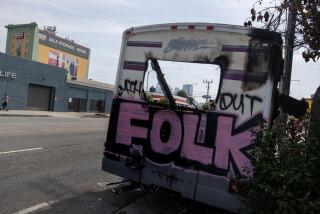City Gears Up to Ban Big-Rigs
- Share via
Scott Mosher saw them again Monday on his way to work in Moorpark. They lined California 118, chugging along the main drag through the suburban city of 32,000.
“Trucks,” he said, “as far away as you could see.”
As executive director of the Boys & Girls Club of Moorpark, Mosher has a vested interest in keeping these trucks at bay. Many of the 110 children who visit his center walk there from nearby apartments, crossing the truck route on their way.
Similarly, local business owners complain that customers are put off by the trucks. About 3,700 a day traverse New Los Angeles Avenue, meaning one out of five vehicles on that road is a truck, according to the Ventura County Transportation Commission.
After years of talk, the city is setting out to do something about the big-rigs. Council members have authorized a $20,000 study to determine whether Moorpark should embark on a full-scale lobbying effort to prohibit truck traffic except vehicles making local deliveries.
City officials know that would not be easy.
Not only is the 118 a state highway, but Moorpark’s portion is designated as part of the National Highway System, a group of arterial routes identified as needed for national defense and interstate travel.
Over the next several months, consulting firm Parsons in Pasadena will conduct the initial study. Its aim, in part, is to determine the city’s chances of success before taxpayers make a greater investment.
Since Moorpark’s incorporation in 1983, residents have complained about trucks. “Opponents would say the road was there before the city, but that’s little solace,” said city Public Works Director Ken Gilbert.
Until highways 118 and 23 were connected in the mid-1990s, trucks snaked through narrow city streets, past single-family homes. The connector road curbed that practice, but city officials say the new stretch of highway opened the floodgates for additional truck traffic.
The problem has also become a political liability for sitting council members. Although none endorses truck traffic, challengers say that incumbents haven’t done anything about the mess.
In fact, the council has broached the issue several times. In 1989, 1994 and 1999, the city sought help through Caltrans. Each time, the state transportation agency advised the city to submit a formal application to ban truck traffic, a process so complex and time-consuming that the city was put off. Three years ago, the city began looking for a consultant to begin the process. There were no takers, officials said, until Parsons.
“It’s not as if we’ve stood idly by and done nothing about this,” said Mayor Pat Hunter. “When you have a state highway that runs through your community and you have no authority over it ... we can’t even determine what kind of signage goes on that highway.”
Kerry Forsythe, deputy director of the Ventura County Transportation Commission, said the city isn’t likely to get far, even with a consultant.
“I think their chances are pretty slim,” Forsythe said. “And there are financial considerations. If they were able to get trucks off the road, they might lose road funding as well. When the consultant report comes in, I think it’s going to say, ‘This sounds nice but we’re really not going to be able to do this.’ ”
Warren Hoemann, vice president of the California Trucking Assn., said his group is open to efforts to set up portable scales and rest areas along the highway around Moorpark. But it opposes the city’s bid to stop trucks from passing through.
“It’s an essential part of the network we need throughout the state to deliver goods,” Hoemann said. “You have a community that was largely a farming community that’s been turned into a bedroom community. The farming community was very accustomed to trucking because it was the lifeblood of what they did. In a suburban community, the same connection isn’t there. But every Wal-Mart and Costco in town couldn’t live if the trucks weren’t coming in.”
Hunter, however, said the city can’t continue to handle the traffic. Pointing to a state law passed two years ago limiting heavy trucks from driving certain roads in the Bay Area, he said the city shouldn’t abandon hope yet.
“This may be [truckers’] preferred alternative,” Hunter said, “but their preferred alternative is having a debilitating effect on our community.”
More to Read
Sign up for Essential California
The most important California stories and recommendations in your inbox every morning.
You may occasionally receive promotional content from the Los Angeles Times.













